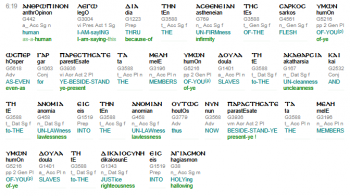Since these believers are slaves of sin,
I think we'll be pretty far apart on some doctrinces if you are thinking that a believer can be a slave to sin. You only think you are. The truth is that in Christ you are set free.
It may not be easy, I can attest! The corruption of the flesh may be severe! But just the same, I do not believe someone who is In Christ, a new creation, is a slave to sin.
Since these believers are slaves of sin,
how could they possibly be slaves of righteousness (v.17)?
You were slaves to sin, but you have obeyed from the heart the teaching . . .
Past tense slaves to sin, now present tense slaves to righteousness, Vs. 22, now being made free from sin.
There is a transition, that we were in the past slaves to sin, I believe due to the corruption in our bodies, our minds, and we have nothing else to work with, so that's what we were, slaves to sin, and we always acted according to that reality.
But now, we've been born anew, this time, not from a corrupted Adamic creation, but now born from a righteous and holy God, sharing that nature, and not the corruption handed down from Adam.
I.E. verses 17 and 22 are NOT TRUE in reality!
Anyone here into reality?
22 But now being made free from sin, and become servants to God, ye have your fruit unto holiness, and the end everlasting life.
This is not true??
I maintain that this idea that we are not free from sin is deception, not that you mean to deceive, the flesh wants to deceive us.
Ephesians 4
19 Who being past feeling have given themselves over unto lasciviousness, to work all uncleanness with greediness.
20 But ye have not so learned Christ;
21 If so be that ye have heard him, and have been taught by him, as the truth is in Jesus:
22 That ye put off concerning the former conversation the old man, which is corrupt according to the deceitful lusts;
23 And be renewed in the spirit of your mind;
24 And that ye put on the new man, which after God is created in righteousness and true holiness.
25 Wherefore putting away lying, speak every man truth with his neighbour: for we are members one of another.
The unsaved, given over to lasciviousness, but not us. That's not how we've learned about Jesus. Here's reality. That we cast off that old life, which is corrupt after the pattern of the "deceitful lusts". That we get our mind restored to what it should be. That we wear the new creation, who God made us, who now share God's pattern, being created in righteousness and true holiness.
You who are in Christ have been recreated in righteousness and true holiness. Your flesh desires lie to you, trying to drag you into sin. But you've been made free from that, so we can stop doing those things, and star doing the right things, after all, we're all part of each other.
Much love!










